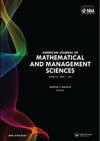Penalized Empirical Likelihood-Based Variable Selection for Longitudinal Data Analysis
Q3 Business, Management and Accounting
American Journal of Mathematical and Management Sciences
Pub Date : 2020-10-28
DOI:10.1080/01966324.2020.1837042
引用次数: 1
Abstract
Abstract Longitudinal data with a large number of covariates have become common in many applications such as epidemiology, clinical research, and therapeutic evaluation. The identification of a sub-model that adequately represents the data are necessary for easy interpretation. Existing information theoretic-approaches such as AIC and BIC are useful, but computationally not efficient due to an evaluation of all possible subsets. A new class of penalized likelihood methods such as LASSO, SCAD, etc. are efficient in these situations. All these methods rely on the parametric modeling of the response of interest. The joint likelihood function for longitudinal data is challenging, particularly for correlated discrete outcome data. In such a situation, we propose penalized empirical likelihood (PEL) based on generalized estimating equations (GEE) by which the variable selection and the estimation of the coefficients are carried out simultaneously. We discuss its characteristics and asymptotic properties and present an efficient computational algorithm for optimizing PEL. Simulation studies show that when model assumptions are true, its performance is comparable to that of the existing methods and when the model is misspecified, our method has clear advantages over the existing methods. We have applied the method to two case examples.基于惩罚经验似然的纵向数据分析变量选择
摘要具有大量协变量的纵向数据在流行病学、临床研究和治疗评估等许多应用中已经很常见。为了便于解释,有必要确定一个充分代表数据的子模型。现有的信息论方法,如AIC和BIC是有用的,但由于评估了所有可能的子集,计算效率不高。一类新的惩罚似然方法,如LASSO、SCAD等,在这种情况下是有效的。所有这些方法都依赖于感兴趣的响应的参数化建模。纵向数据的联合似然函数具有挑战性,尤其是对于相关离散结果数据。在这种情况下,我们提出了基于广义估计方程(GEE)的惩罚经验似然(PEL),通过广义估计方程同时进行变量选择和系数估计。我们讨论了它的特性和渐近性质,并提出了一种有效的PEL优化计算算法。仿真研究表明,当模型假设成立时,其性能与现有方法相当,当模型指定错误时,我们的方法比现有方法具有明显的优势。我们已将该方法应用于两个实例。
本文章由计算机程序翻译,如有差异,请以英文原文为准。
求助全文
约1分钟内获得全文
求助全文
来源期刊

American Journal of Mathematical and Management Sciences
Business, Management and Accounting-Business, Management and Accounting (all)
CiteScore
2.70
自引率
0.00%
发文量
5
 求助内容:
求助内容: 应助结果提醒方式:
应助结果提醒方式:


